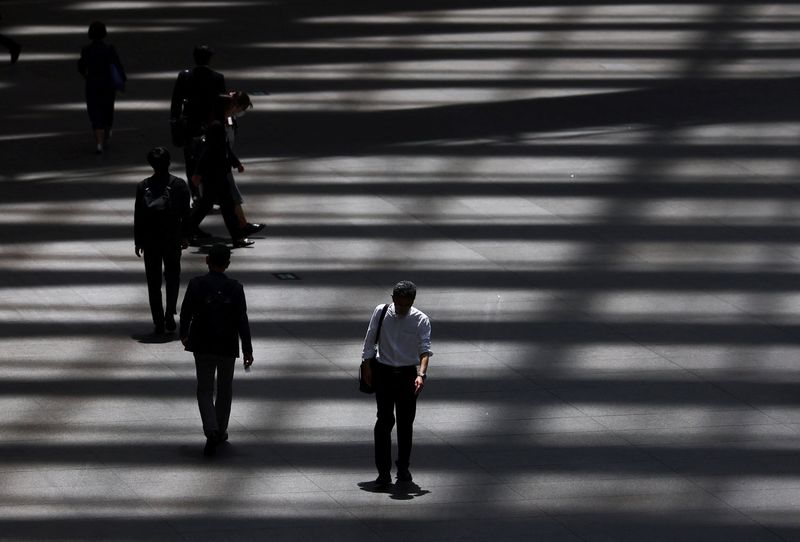By Leika Kihara
TOKYO (Reuters) -Japan’s economy shrank for the first time in a year in the March quarter at a faster pace than expected, data showed on Friday, underscoring the fragile nature of its recovery now under threat from U.S. President Donald Trump’s trade policies.
The data highlights the challenge policymakers face as steep U.S. tariffs cloud the outlook for the export-heavy economy, particularly for the mainstay automobiles sector.
Real gross domestic product (GDP) contracted an annualised 0.7% in January-March, preliminary government data showed, much bigger than a median market forecast for a 0.2% drop. It followed a revised 2.4% increase in the previous quarter.
People walk through a convention hall in Tokyo
The decline was due to stagnant private consumption and falling exports, suggesting the economy was losing support from overseas demand even before Trump’s announcement on April 2 of sweeping “reciprocal” tariffs.
“Japan’s economy lacks a driver of growth given weakness in exports and consumption. It’s very vulnerable to shocks such as one from Trump tariffs,” said Yoshiki Shinke, senior executive economist at Dai-ichi Life Research Institute.
“The data may lead to growing calls for bigger fiscal spending,” he said, adding the economy could contract again in the second quarter depending on when the hit from tariffs intensifies.
On a quarter-on-quarter basis, the economy shrank 0.2% compared with market forecasts for a 0.1% contraction.
Private consumption, which accounts for more than half of Japan’s economic output, was flat in the first quarter, compared with market forecasts for a 0.1% gain.
Capital expenditure increased 1.4% compared with market forecasts for a 0.8% gain, the data showed.
External demand shaved 0.8 percentage point off GDP growth as exports fell 0.6%, while imports rose 2.9%. Domestic demand, by contrast, added 0.7 point to growth.
“Capital expenditure rose probably due to front-loading ahead of Trump tariffs. The economy may avert negative growth in April-June, but will lack momentum,” said Takeshi Minami, chief economist at Norinchukin Research Institute.
“If the impact of Trump tariffs is fairly light, the Bank of Japan could raise interest rates again in September or October. But if the tariffs deal a severe blow to capital spending and exports, rate hikes could be put on hold,” he said.
A global trade war touched off by U.S. tariffs has jolted financial markets and complicated the BOJ’s decision on when and how far it can push up interest rates.
Story Continues
